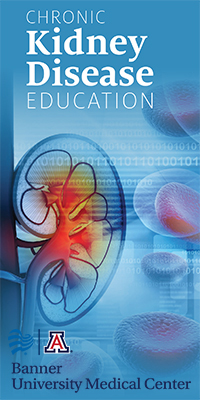 After a trial run in July, the University of Arizona Division of Nephrology and Banner – University Medical Center Tucson will begin a rotating schedule of five informational sessions to help patients and their families better understand how to manage their kidney disease.
After a trial run in July, the University of Arizona Division of Nephrology and Banner – University Medical Center Tucson will begin a rotating schedule of five informational sessions to help patients and their families better understand how to manage their kidney disease.
The classes are provided free of charge to those with chronic kidney disease (CKD)—stage 4 kidney failure—who are referred by a nephrologist.
The first session will be hosted Aug. 29, 5:30-6:30 p.m., in the hospital cafeteria, Dining Room 2500F, at Banner – UMC Tucson, 1501 N. Campbell Ave., Tucson, AZ 85724. To register for classes, please call (520) 626-1034. For the brochure to learn more, ![]() click here [PDF].
click here [PDF].
 “We’ve received all our patient educational materials and are ready to begin,” said Jackie May, NP, manager of the program who started at Banner in May but has more than 20 years of experience as a nurse practitioner—12 in nephrology, or kidney care. She recently moved to Tucson from Rockford, Ill., because her husband took a job here.
“We’ve received all our patient educational materials and are ready to begin,” said Jackie May, NP, manager of the program who started at Banner in May but has more than 20 years of experience as a nurse practitioner—12 in nephrology, or kidney care. She recently moved to Tucson from Rockford, Ill., because her husband took a job here.
“We have held a few small classes for people with advanced kidney disease who had to make decisions quickly regarding a treatment option. One was in Spanish, where we needed a translator to make sure the people and their families understood how to weigh their options.”
The five-part series focuses on:
- The Kidney — kidney functions, stages and causes of kidney disease
- Preserving Kidney Function — management of health conditions and strategies to preserve function
- Diet in Kidney Disease — dietary management in CKD
- Medication and Labs — medication concerns in CKD, avoiding toxins and common lab tests
- Treatment Options — available treatments in advanced CKD such as dialysis, home therapies, transplant and conservative management
"We will offer the classes on an ongoing basis to meet our patients' needs as they arise."
The Arizona Kidney Foundation reports that 600,000 Arizonans have CKD, but only 10 percent are aware of it. Nationally, estimates suggest up to 26 million—or one in nine—American adults suffer from it, with only 4.9 million actually diagnosed with kidney disease, reports the U.S. Center for Disease Control and Prevention. It ranks as the ninth leading cause of death in the United States.
 Early detection is the key to slowing progression of kidney disease, according to Prabir Roy-Chaudhury, MD, PhD, division chief and national co-chair of the Kidney Health Initiative—a public-private partnership between the American Society of Nephrology and U.S. Food and Drug Administration. This educational initiative is designed in part to help do that, he added.
Early detection is the key to slowing progression of kidney disease, according to Prabir Roy-Chaudhury, MD, PhD, division chief and national co-chair of the Kidney Health Initiative—a public-private partnership between the American Society of Nephrology and U.S. Food and Drug Administration. This educational initiative is designed in part to help do that, he added.
May acknowledges mixed emotions people may feel when confronted with the reality their kidneys are failing and they may need to go on hemodialysis or prepare to enroll in a program for kidney transplant.
"Most of the people in the classes are very appreciative of the information but can find it very stressful to make decisions about something so serious and life changing," she said.
"The focus of several of the classes is to aid patients in making healthy choices to help preserve kidney function and delay the need for treatments such as dialysis or kidney transplantation."
EXTRA INFO
For additional information on this topic, please visit the following websites:
- American Association of Kidney Patients - https://aakp.org
- American Kidney Fund - http://www.kidneyfund.org
- Kidney Health Initiative - https://www.asn-online.org/khi/
- National Institute of Diabetes and Digestive and Kidney Diseases - https://www.niddk.nih.gov/health-information/kidney-disease
- Organ Procurement and Transplantation Network - https://optn.transplant.hrsa.gov/data/organ-datasource/kidney/
- National Kidney Foundation - https://www.kidney.org
- Arizona Kidney Foundation - https://azkidney.org

